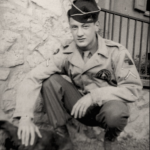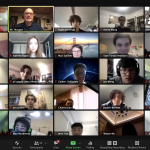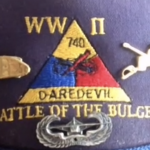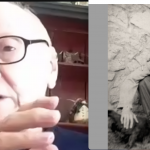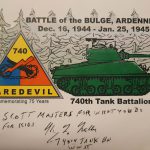Harry Miller was born July 2, 1928 in Columbus, Ohio. He would serve in the American Army in the Second World War, when he was not yet 18 years old. Harry’s mother died when he was only 3, so it would be his father and sister who guided the family through the difficult days of the Great Depression. Harry started high school, but quit – to support the family, and then to join the army. Harry was so impacted by the casualties of the Dieppe raid that he tried to join the Canadian army at first, but they did not take him, so the teenaged Harry managed to work his way into the American army – and keep his age secret. He began his basic training, and quickly began to specialize in tanks, doing armoured corps training at Fort Knox. A time at Fort Ord followed, learning about the new AVTs, and then it was time to head overseas, right into LeHavre, France. Harry was assigned as a replacement for the 740th Tank Battalion, and he headed to Belgium, where he met up with his unit, late in 1944. As it turned out, the Germans were just about to start their Ardennes offensive – the Battle of the Bulge – and Harry was thrown right in the middle of it. Unprepared for the onslaught, Harry and his fellow soldiers cobbled together two tanks and a tank destroyer from an ordnance depot, and off they went to join the front line combat, where their hastily assembled unit was able to stop the 1st Panzer Division with a few well-placed salvoes. A lot of intense combat followed in the upcoming days, as American units gave up and then took back territory. The next task was to cross the Siegfried Line and enter into Germany itself, which the 740th did alongside the 82nd Airborne. They moved from one city and town to the next, often obliterating cities where the Germans would not surrender, and then crossing back over the Siegfried Line to help other units advance. The 740th began moving deeper into Germany, encountering resistance and bitter fighting along the way, especially in the Ruhr Pocket battle. After some time off in Dusseldorf they were given the order to head to Germany’s northern coast, where they saw British and Canadian troops; their joint mission was to secure the area, so that Soviet troops could not move into Denmark. And that’s where Harry was when the news came out that the war was over, and Harry recalls he and the other soldiers wanted nothing more than to sleep. Harry ended up going into the Army of Occupation, and he became part of the Constabulary, helping to maintain law and order, and returning DPs to their countries of origin. During that time, Harry also visited the Nazi concentration camps, something that affected him deeply. Harry decided that he’d make the military a career, and after a short stay in the US, he was shipped to the Far East, where he joined General MacArthur’s HQ in Japan. Not long after that the Korean War began, and Harry accompanied MacArthur to Korea on a number of occasions, acting as part of his communications team. Harry’s service continued into the 60s, by which time he had changed over to the air force and was attached to Strategic Air Command (SAC). Harry was there during the Cuban Missile Crisis and when Vietnam started, and he served during both of those conflicts, venturing to Vietnam several times. When the time came to retire, Harry did not hesitate, and he and his wife staked their place in civilian life, and he continues to do the same with his present-day partner Linda, as they ride out the pandemic together. Harry Miller was interviewed over zoom by Scott Masters and Crestwood students in March 2021.
Videos
Click next video below to keep watching
- 1. Prewar Family and Memories
- 2. Awareness of the War; A Teenager in the Army
- 3. Training
- 4. The Troop Ship; Joining the 740th
- 5. The Battle of the Bulge
- 6. From Stoumont to the Siegfried Line
- 7. Weather, Air Attacks and POWs
- 8. Battle Fatigue, the Crew and the Tiger
- 9. Moving North; VE Day and the Occupation
- 10. The Camps
- 11. Staying in the Military; From Europe to Asia
- 12. Harry's Job in Korea
- 13. The Cold War
- 14. From the Army to the Air Force
- 15. Cuba and Vietnam; Leaving the Air Force
- 16. Looking Back
